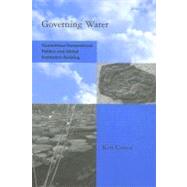Governing Water Contentious Transnational Politics and Global Institution Building
, by Conca, Ken- ISBN: 9780262532730 | 0262532735
- Cover: Paperback
- Copyright: 9/30/2005
Winner of the 2006 Harold and Margaret Sprout Awardpresented by the International Studies Association (ISA) and Winner of the 2006 Chadwick F. Alger Awardpresented by the International Studies Association (ISA) Water is a key component of critical ecosystems, a marketable commodity, a foundation of local communities and cultures, and a powerful means of social control. It has become a source of contentious politics and social controversy on a global scale, and the management of water conflicts is one of the biggest challenges in the effort to achieve effective global environmental governance. In Governing Water, Ken Conca examines political struggles to create a global framework for the governance of water. Threats to the world's rivers, watersheds, and critical freshwater ecosystems have resisted the establishment of effective global agreements through intergovernmental bargaining because the conditions for successful interstate cooperation-effective state authority, stable knowledge frameworks, and a territorialized understanding of nature-cannot be imposed upon water controversies. But while interstate water diplomacy has faltered, less formalized institutions-socially and politically embedded rules, roles, and practices-have emerged to help shape water governance locally and globally. Conca examines the politics of these institutions, presenting a framework for understanding global environmental governance based on key institutional presumptions about territoriality, authority, and knowledge. He maps four distinct processes of institution building: formal international regimes for shared rivers; international networking among water experts and professionals; social movements opposing the construction of large dams; and the struggle surrounding transnational water "marketization." These cases illustrate the potential for alternative institutional forms in situations where traditional interstate regimes are ineffective.







